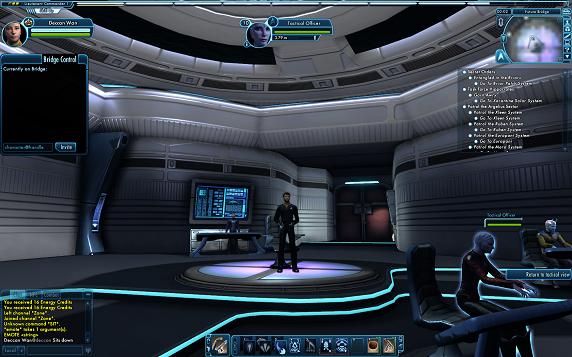
I’m still playing Star Trek Online and paid up for another month (though in typical fashion, Cryptic messed up and charged my credit card twice!) Sadly due to my limited playing time and intermittent connectivity problems, I’m still just a Lieutenant-Commander but I’ll likely hit Commander is a couple of days. Since I’m about to move to a new rank and with it, a shiny new ship, I thought I’d write some stuff about how character progression works in this game.
Note that this won’t be a comprehensive strategy guide. There are far better guides out there on the net already. It’ll just be explanation in plain English about how things works in this game, especially for people who might be curious but don’t actually want to play the game. Star Trek Online has no statistics like Strength, Agility, Intelligence etc. that you find in most RPGs. Instead, every character starts the same, but choosing traits, whose availability is linked to the choice of races, can give character-specific bonuses. Each character has four traits but up to two of them may be fixed depending on your race. Like everything else in the game, traits are either ground-based or space-based. Ground-based traits, skills and abilities never help in space combat and vice versa.
For example, Vulcans must take two traits, both of which ground-based. The Logical trait helps them to resist psionic damage as well as some types of crowd control powers. The Physical Strength trait increases the damage they do in melee combat. In addition, they can choose two more traits from the general pool but not traits that are available only to a specific race.
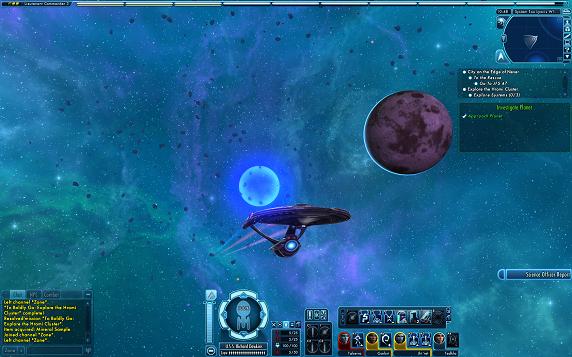
The closest equivalent to the classes of other RPGs in Star Trek Online is the choice of career tracks, of which there are three: Engineering, Science and Tactical. However, as I’ve previously mentioned, while the choice of class is a character defining moment in other games, it affects surprisingly few things in this one. Specifically, choosing a career track has the following effects:
- Each career track has a specific skill category that’s not shared with the other tracks but everything in this category affects only ground combat.
- You get special abilities to use for both ground and space combat that are specific to your career track at certain level milestones.
- Kits, special player-only items that grant abilities in ground combat, are also divided according to career tracks.
- Improving certain skills to the maximum level allows you to train the appropriate Bridge Officer to have the related special ability, provided that you share the same career track as the officer.
Regardless of career track, you can still:
- Fly any ships you want. Each career track corresponds with a ship type, i.e. engineers with cruisers, tactical officers with escorts and science officers with science vessels, but the game doesn’t enforce it as a restriction. This allows some interesting combos. If you’re an Engineer in an escort, you’ll do less damage than a tactical officer in the same ship, but will last longer in a fight, for example.
- Invest in any skills you want outside of the career specific category. This means the vast majority of skills. The aforementioned engineer for example can invest in piloting skills for escorts so he can fly one just as well as a tactical officer instead of putting points in cruiser piloting skills.
- Apart from kits, use any items for both ground and space combat. Item usage is limited by current rank but not by career track.
Generally speaking most people agree that space combat is the best part of the game and by far the most important thing that affects how space combat plays like is your choice of ship. Since your choice of career doesn’t restrict what ships you can fly, it really doesn’t have as big an effect as you might think.
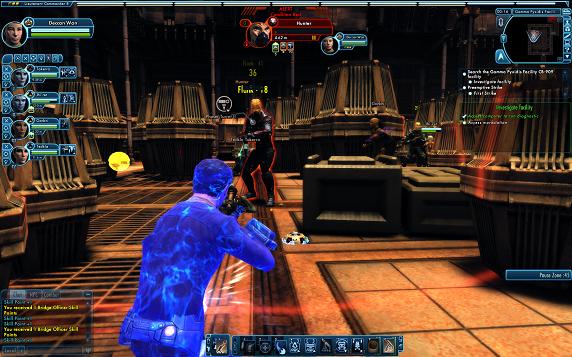
Star Trek Online awards skill points instead of experience points whenever you complete a mission or kill an enemy. The difference is that these points can be spent immediately once you earn them to put into skills. Note that skills should not be confused with abilities. Abilities are always player activated actions with cool downs. Skills either provide a passive benefit that is always on, for example ship piloting skills improve the hull strength and maneuverability of the stated ship type, or else improve the abilities linked to it. For example, Jam Sensors is a science special ability that prevents enemies from targeting anyone in combat for a short time and investing in the skill Starship Sensors will make the ability better.
Currently there are six ranks in the game. You begin the game as an Ensign, the equivalent of level 0, but rapidly become a Lieutenant at the end of the opening tutorial. Each rank has ten grades, so you have Lieutenant Grade 1 to Lieutenant Grade 10. After ten grades you move on to the next rank, i.e. Lieutenant-Commander, Commander, Captain and finally Rear-Admiral. Each new rank opens access to a new tier of ship and skill choices. For example, only Captains can fly the Galaxy-class exploration cruiser and put points into the Exploration Cruiser skill.
When you reach a new rank, you also have the opportunity to promote your NPC Bridge Officers who must always be at least one rank lower than you. Promoting officers costs Starfleet Merit Points which are earned by completing missions. These can also be spent to requisition new Bridge Officers and to train existing ones to have new abilities. In order to be eligible for promotion however, you must spend enough Bridge Officer Skill Points to improve the Bridge Officers. This comes from a separate pool from your own Skill Points and unlike your own pool, there is no cap to the amount of B.O. Skill Points you can earn. B.O.s also don’t have the same skill system as players. You can spend the points to improve only the special abilities that they already know.
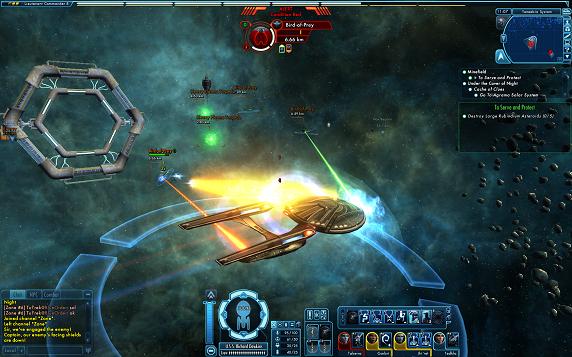
Bridge Officers are probably the hardest part of the character progression system to understand. When you get a new B.O., you get to see all of their special abilities, but only the ones up to their current rank will actually be available. On the ground, they serve to fill out your Away Team and will use all of their available special abilities up to their current rank. In space however, their available abilities will be limited by either their rank or the rank of the station they’re assigned to, whichever is lower. So even a Lieutenant-Commander engineering B.O. can only use Ensign-level special abilities if he’s assigned to an Ensign-level engineering station. The type and number of stations you have available depends on which ship you’re flying.
If you’re still following all this, you’ll realize that your choice of B.O.s determines which special abilities you have available to use. I understand that this makes some B.O.s quite valuable as it’s quite rare to get some improved versions of specific special abilities. This also means that there’s a natural synergy between the special abilities provided by B.O.s and the skills the player possess. All of the points invested in Starship Sensors would be wasted if you have no science B.O. with special abilities that depend on that skill. For this reason, choosing and properly developing your B.O.s is as much a part of the character progression system in Star Trek Online as developing your own avatar.
All of this makes Star Trek Online quite a bit different from other games so I hope that this post clears things up a bit for some people. My complaint on this front is that things are still very badly documented and it isn’t at all clear which skills affect which special abilities so it’s hard to tell sometimes what to invest your finite skill points in. For example, the skill Starship Engine Maintenance quite unintuitively appears to affect the EPS Power Transfer special ability while no skills appear to affect the effectiveness of the Boarding Party ability at all, which seems odd. Since Cryptic recently added some new skills in a patch, I suspect that things are still up in the air and subject to change. Let’s hope that they’ll be generous with the respec options so we won’t be stuck with characters we don’t want.
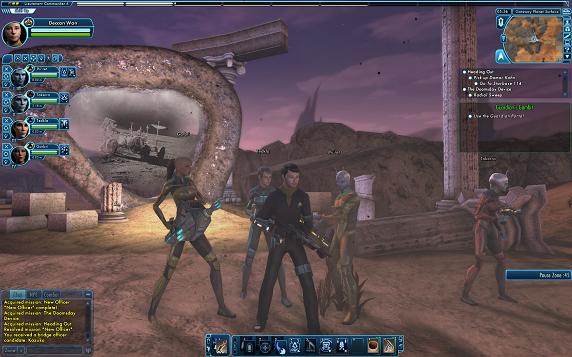
4 Responses to “Character progression in Star Trek Online”
What’s funny is that I came onto this site interested in buying your magic cards but now I’m reading the rest of the blog. This is a nice write-up on Star Trek Online, which is a game that I’ve been interested in taking a look at but worried about whether the plunge was worth it.
It sounds like it has a lot of the classic Cryptic problems, the biggest one being a lack of content at release. Especially when it comes to Star Trek, I’d like to see a good diversity of missions and lore. From what you wrote, the game seems to fall short on this front. I wonder if this will turn around as time goes on and content is added bit by bit.
One of my friends had an interesting thought about STO when it was first announced. He thought it was be a great idea to actually have player characters assigned to each major role in a ship. Thus the party system (a mechanic common among most MMOs) would actually replicate a ship’s hierarchy and chain of command.
Problem is, I see everyone wanting to be captain.
Yeah, there definitely isn’t enough content and all the content that it has is way too combat oriented. There was a mission early on that had you talking to a bunch of colonists to understand their problems and bring them to the attention of Starfleet with no fighting involved at all, but I haven’t encountered anything similar since.
I don’t plan on playing this for long. Probably only for a couple of months. It’s best to think of it as a single-player game (albeit an expensive one with the subscription!) with multiplayer components. There really isn’t enough content in it to be an MMO. Just the same, I’m enjoying the space combat and I like all the little references to past episodes and stories.
Your friend’s idea was one that came up early during the development process, but I don’t really see how it would work in this game. As you say, everyone would want to be captain and is there enough gameplay in the model for those who aren’t?
For an interesting implementation of the idea, you might want to check out Allods Online, a new free-to-play MMO. I haven’t played it myself but from what I’ve read, the endgame PVP involves a bunch of players controlling one ship. One guy does navigation. One guy does speed, pitch and yaw. Another guy does damage control. The rest are on guns or boarding duty against other ships etc. It sounds like something that might work.
That Allods Online game sounds like something interesting. I might have to check it out. The only thing is that for me personally, it’s as much the role development in the lore, missions, and roleplaying parts of the game as actually fulfilling that role in a group setting that makes it entertaining. Do you know if Allods Online just uses that system as a combat mechanic or actually integrates it into the story of the game?
I also think there are SOME people out there who’d want to play something other than the captain (I think being a Science Officer or an Engineer actually sounds pretty fun) but probably not enough for the survival of the game. It really does seem like the particulars of the MMO market (namely the massive presence of WoW and the difficulty of success in that industry) diminish a lot of incentives to make something new, exciting, and innovative in the genre. There’s just too much money to be lost in making a game and not enough market out there to win.
Though I’ve recently come upon an exception: an MMO called Love. It’s an indie game. Here’s a link:
http://www.quelsolaar.com/
I really like how its stylized but I’m unsure on the actual gameplay setting. Anyway, enjoy.
Trackbacks
Leave a Reply